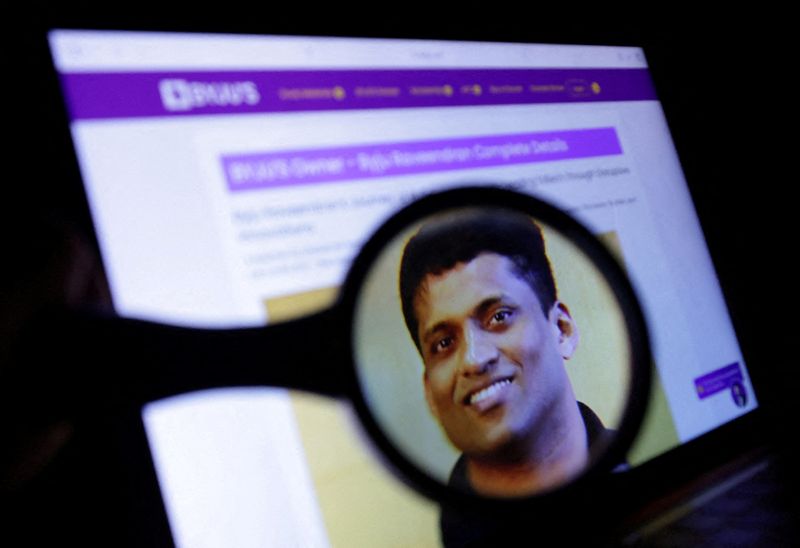By Aditya Kalra
NEW DELHI (Reuters) – Byju Raveendran, an Indian mathematician who rose from teacher to billionaire startup before his education technology company went bankrupt this year, now faces his biggest test.
The future of Raveendran’s eponymous Byju’s online coaching company is in the hands of India’s courts after the country’s largest startup, once beloved by global investors who valued it at $22 billion, fell below its $2 billion valuation. The 44-year-old founder lost control of the company last week when a court initiated insolvency proceedings.
The son of a family of teachers from a small village in southern India, accused of “financial mismanagement and regulatory issues,” faces a showdown that will test the ingenuity that has made him a figurehead for Indian startups.
His previously successful company collapsed when it failed to pay $19 million in sponsorship fees to the Indian Cricket Association, leading to a court suspending Byju’s board and ordering Raveendran to report to a court-appointed restructuring expert.
An appeals court is expected to hold a hearing on Monday on whether Byju’s insolvency proceedings should be halted after the former billionaire argued in court that his company is solvent and that insolvency could close it down and cost the jobs of 27,000 staff, including teachers. Insolvency would also not bode well for Byju’s backers, such as Dutch technology investor Prosus.
Raveendran denies allegations of mismanagement and misconduct at his company, which has been hit by lawsuits in recent months over unpaid loans and boardroom conflicts with foreign investors as it went public.
Potential bankruptcy is a dramatic turn of events for an entrepreneur. Someone who worked with him described him as a very passionate and goal-oriented person who could take an ‘abrasive approach’ in a crisis.
Raveendran came across as a “neat, polite and well-groomed” executive who listened to advice, but “ultimately there was a lack of trust,” said another executive who resigned as a senior vice president at Byju’s last year.
“He said things are getting better, don’t worry, we have the money,” the former executive said.
Raveendran and a spokesperson for Byju’s did not respond to requests for comment.
BYJU’S DOOM: ‘OUR FAIR SHARE OF WRONGDOERS’
An engineer by training, he started Byju’s in 2011 with physical education classes after friends urged him to become a teacher.
Raveendran, who, according to the company’s website, successfully completed a major management exam in India “with a 100 percentile score, not once but twice,” started what would become his empire with his wife Divya Gokulnath, 38, a former student of his.
In education-obsessed India, Raveendran struck gold offering online tutoring programs for $100 to $300. He got a huge boost when the COVID-19 pandemic sent students indoors. At the height of his fame in 2021, he and his wife had a net worth of $4 billion, Forbes estimated.
Now that has all fallen apart.
According to executives and consultants who worked with Raveendran, the downfall of Byju’s success can be attributed to the fact that he ignored his colleagues and expanded the company through expensive acquisitions. He spent heavily on marketing and was slow to address problems, such as aggressive tactics by salespeople to sell courses that damaged the company’s reputation.
Backed by investors including General Atlantic, Prosus and Facebook founder Mark Zuckerberg’s philanthropic project, Raveendran has spent millions on acquisitions. The company says it has 150 million students in more than 100 countries.
“While we grew rapidly, as I have admitted many times, we also made our mistakes,” Raveendran told an interviewer at the World Economic Forum in Davos last year.
While battling the crises, the CEO also said that decisions to lay off some of the then 50,000 employees and cut branding costs would strengthen the loss-making Byju’s and make it cash flow positive.
“Every country needs a Byju’s,” he said.
(This story has been resubmitted to correct a typo in paragraph 2)
(Reporting by Aditya Kalra; Editing by William Mallard)
